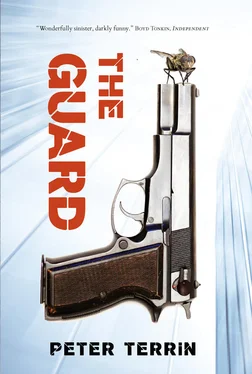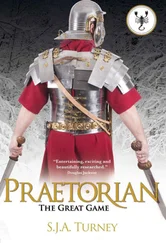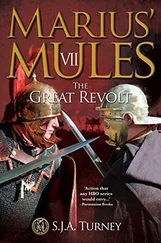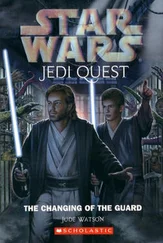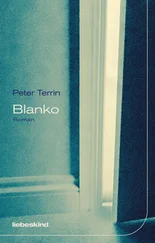Perhaps she would prefer to not hire any guards at all, telling herself that none are needed, that the state of grace in which she lives will go on forever. After all, nothing has happened for so long. Gradually she would forget the threat, bolstering the illusion. Not one secure second would be spoiled again. Until the day they’ve all been used up.
50
The last tin of corned beef. We’ve stretched it out so thriftily over several meals that the last bit tastes strange, already slightly tainted. We no longer eat the meat on bread. I lay the precious cube on my tongue and smear it against the roof of my mouth. The saliva starts to flow and mixes with the salty taste. I wait for a long time, until my taste buds are saturated, then swallow tiny gulp after tiny gulp until my mouth is empty. Harry eats the meat a little faster, but with comparable attention. We’ve wiped the tin out with bread several times. We’ve pushed the tips of our tongues into the corners. Harry has put the tin on the floor next to the leg of the chair. It sits there like a memento, no longer smelling even slightly like something edible.
51
I could just snap that he’s damn right. Kneeling in front of the toilet bowl, I keep my fingertip on the enamel. The toilet is leaking and together we stare at the stream of water splitting into two. It’s as if I’m constantly pointing at him, the transgressor, forcing him to repent. He apologizes. He won’t be so remiss again. He spontaneously promises to always push the button up with his finger. He swears it on his father’s grave. Because he understands better than anyone my need to keep the environment clear and tidy so that my thoughts can settle into their familiar groove and relax a little. That’s all. I’m not asking for anything else and Harry realizes that. That’s why he bows his head, ashamed of his careless negligence. I stand up, brush the dust off my knees and tell him it’s okay. No, he says quietly, it’s not okay. As he’s leaving the toilet, I briefly lay a hand on his shoulder. We’re a unit; we take each other into account. We depend on each other. He watches over my freedom, I watch over his. That allows us to relax and sleep at night. In this world we are each other’s only security. We differ, that’s true, but those differences make our unit more complete; the organization has paid careful attention to that. We are like a left eye and a right eye. Together we see depth.
52
I study the bare tree through the crack to the side of the entrance gate. Over the whole crown there are a dozen dry leaves still hanging, each at the tip of a branch in the very place where they are most exposed to the wind. I don’t know if this is a sign. The old fear of a nuclear disaster takes hold of Harry.
“Have a smell.” He nudges me and stares intently at my nose as I stick it in the crack. I doubt that radioactive fallout can possibly manifest itself as a smell. I feel like a canary in a coal mine. I breathe in reluctantly and instantly distinguish stone and iron, smells which become ordinary even during that first inhalation and cannot in any way be linked to danger. After three or four breaths, I’m convinced that there’s nothing else to smell. I look back at the tree. I look at the section of wall tapering up to street level, over which, once again and for weeks now, the strange, dark-black shadow of an elongated, triangular object outside our field of vision has been slowly sliding; it will disappear again in spring.
“If it was a bomb,” I say, “an explosion, then it must have happened a long way away. No more than a couple of nuclear warheads, maybe a targeted strike against a city on the south coast. A large-scale attack would have caused a cloud of dust that blocked out the sun.”
Harry leans on the entrance gate. “The groundwater’s contaminated,” he mumbles to himself. “The tree has been defoliated through the groundwater, through the roots. It’s nothing to do with the season. That’s why the leaves on the end of the branches have been spared the longest.”
A nuclear disaster or a small-scale atomic attack would explain a lot, first of all the silence in the city: a mass evacuation or wholesale flight to escape airborne death. Is it possible to clear an entire city, or better, is it possible to mute all of a city’s noises? I concentrate hard on Arthur; snippets of his monologues about the construction of the building echo in my mind, but not once do I hear him talking about lead. Or is that something that has been taken for granted for ages? Including lead lining in the walls of extremely expensive new buildings? Is that why we never get to see the remaining resident? Because there’s no need for him to show himself? We’ve already determined that he must have an immense larder at his disposal.
I think of the driver, the young guy who, instead of appearing in uniform, showed up last time in a baggy blue sweater and pants without a crease. I wonder if lead thread is woven into those garments, if that could be the explanation. Was he decked out in a new kind of chain mail?
Will Harry and I end up besieged by desperate mobs, repulsively mutilated, who attack slowly and with inhuman patience, scratching at the concrete for months on end with screwdrivers and knives until the groove disengages and they, with their combined strength, can push the entrance gate just far enough aside? Will we be able to maintain our mental health until the last moment, saving our fire until the enemy is in sight?
53
Harry bends over the basement floor plan, gripping the table tight as if he’s about to lift it up and hurl it across the room in fury. I’m standing at the short end, at right angles to the plan. He doesn’t agree with me. He says it would be a sign of weakness. What clearly disturbs him the most is not the nature of my question, but my having asked it at all. He can hardly believe I’ve asked a question like that, he’s disillusioned. “Don’t you think,” he says after a while, without looking up, “that the organization will inform us when the organization considers it necessary to inform us?”
“We could just touch upon it in passing?”
“You want to exchange chitchat with a punk like that?”
“I mean, we could ask him an innocent question or raise the subject without immediately exposing ourselves.”
“You’ve gone crazy. You do you realize that, don’t you? Asking a subordinate for an explanation. Don’t you understand? That would be risking everything we’ve built up so far. In all the time we’ve been posted here, the organization hasn’t heard from us once, not once. For the organization we’re a completely autonomous two-man unit that looks after itself and that’s why we’re on the verge of a well-earned promotion to the highest level you and I can ever attain. We’re a two-man unit that knows what it has to do — guard this basement — and also knows what it’s better off not doing — asking superfluous questions. And that’s what you want to start doing in the middle of resupplying, during a standard situation, the only occasion on which we might possibly be subjected to one last test before the organization decides to transfer us to the elite. Just think about it, Michel. Think!”
He doesn’t deign to look at me, he’s deeply disappointed. It was an ill-considered suggestion. I look straight at Harry, waiting for him to glance in my direction so I can express my regret wordlessly. But he points at the map, at the entrance gate, and carries on where he left off. The hairs of his mustache are hanging down over his upper lip, the tips discolored by the acidity of his saliva.
“So he comes in here. He’ll open the gate and drive the van into the basement. You take up position at Garage 3, keeping him covered. I’ll ask for his ID and a confirmation. When I give the signal, you walk to the rear of the van. The moment the driver opens the doors, we have to assess the situation.”
Читать дальше
